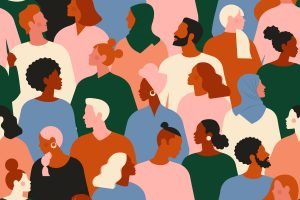Today we are joined by award-winning researcher, consultant and Associate Professor of Management at Babson College, Dr. Tina Opie. She advises small and large firms and individuals in the financial services, entertainment, media, beauty, educational, and healthcare industries among others.
As a consultant, Tina’s work provides organizations with strategic direction on how to create more diverse, inclusive and equitable workplaces. Her consulting work has helped organizations such as American Express, Hulu and the NFL. Her work has appeared in such outlets as O Magazine, The Washington Post, The Boston Globe and Harvard Business Review. She is also a regular commentator on Harvard Business Review’s Women at Work podcast and Greater Boston’s NPR affiliate television station WGBH. As a thought leader who combines practice and theory, her work has proven to generate high-impact solutions that unleash the power of authenticity in organizations.
It’s About Engagement
Tina began the conversation by reminding us that engagement is everywhere. At a foundational level, businesses exist to engage a marketplace with its products and services. To do so, it must engage with many others – employees, investors, local community, vendors, and so on – to be successful.
The world today seems polarized in many ways, and there is a lot of disengagement in the news and on social media. Recently, the most visibale has been in the arena of racism, but human history is littered by “us versus them” biases, discrimination and conflicts: tribes, religion, nations, gender and gender identification to name just a few.
As business leaders we must take the topic of engagement seriously and build skills in ourselves and our people to engage in open dialog about difference and discrimination.
Breaking Barriers to Engagement
The conversation proceeded by naming some of the more common barriers to engagement. Between people disengagement comes from inauthenticity which stems from various sources including fear of blame, lack of trust, worries about popularity and likeability or even avoidance of conflict. Likewise, employees can be disengaged by their work because they may be bored, not feel appreciated or aren’t aligned to the purpose or values of the organization.
For people of privilege (classically white, male, protestant, and straight in North America), fear of dialogue about inequality is common. This group wants to believe in the meritocracy narrative when, in reality, marginalized individuals have had a much more difficult path to success. Debunking this belief system creates fear; the fear that they will have to give something up to reach equality.
Tina proposes an approach to creating engagement between individuals she calls the DIG and BRIDGE system. This is a sequential approach where people first DIG deep to understand their own perspectives, opinions, biases and blind spots. Only with clear understanding of our true, authentic self, can we then begin to attempt to move to the next phase.
The goal of the BRIDGE phase is to build connection with others. It must be a give-and-take interaction. If we are just in dialogue to take information, or worse to strong-arm someone to our perspective, then this step fails.
An essential skill in this phase is questioning. Leaders must use good open questions, probe for interests and root causes behind positions, and seek to expand the shared pool of information.
When we look at groups holding common beliefs or perspectives, we often find they will fall into 20-60-20 categories relative to ourselves:
- 20% are our friends, or family, who share our beliefs. These tend to be the people we like spending most of our time with.
- 60% disagree with us but are open to learning and connecting.
- 20% have their heels dug in and no matter what about of dialogue there is, they won’t change their minds.
Tina suggests that our effort is best spent approaching the middle 60%; that is where the opportunity is.
Biases, Blind Spots, and Fear
Wells Fargo CEO Charles Scharf was recently quoted as saying there wasn’t enough qualified candidates in the labour pool to fill the positions that they needed at the company. This resulted in a firestorm of both offensive and defensive commentary on social media.
Tina used this as a classic example of the pipeline argument often used by business leaders as an excuse for a lack of workforce diversity. Tina described how this is almost always faulty because:
- Employers just don’t know the facts about the labour pool they are looking at, AND/OR
- Their qualification criteria have built in biases. For example, looking for 30 years of experience in a C-suite role reinforces the historic nature of system bias (e.g. not hiring a woman CEO reinforces the system that generates too few women CEOs).
As leaders interested in diversity and equality, we need to work to remove these biases in ourselves and our organizations. One strategy is to challenge ourselves to converse with, read and follow people who are different than us, who have a different life experience, rather than always falsely feeling affirmed because our community is people like us or who want to agree with us.
The future it’s not all negative, and there are hopeful signs going forward. Tina cites the fact that conversations and dialogue are beginning now, and the contrast is significant when compared to just a few decades ago.
Take Your Business and Leadership to the Next Level
You can view the entire Unleashed episode below, and if you would like to learn more about Tina’s work you can visit her website or follow her on Twitter. She also referenced the book, “The Person You Mean To Be” as an excellent resource on bias and racism.
At Results we care about your success, we understand how overwhelming it can feel to run a business, and we’re here to help. Reach out to Nicole through our contact form for ways to unleash the potential of your business.
Visit the Unleashed Podcast Library where you’ll find exclusive conversations with world-class thought leaders, authors, and leadership experts.
Each episode of Unleashed is hosted by Results’ CEO Jeff Tetz who spends most of his day exploring what makes high performers tick and helping build a community of leaders who want to learn and grow together. Follow Jeff (Twitter; LinkedIn; Instagram) for more great leadership insights.



